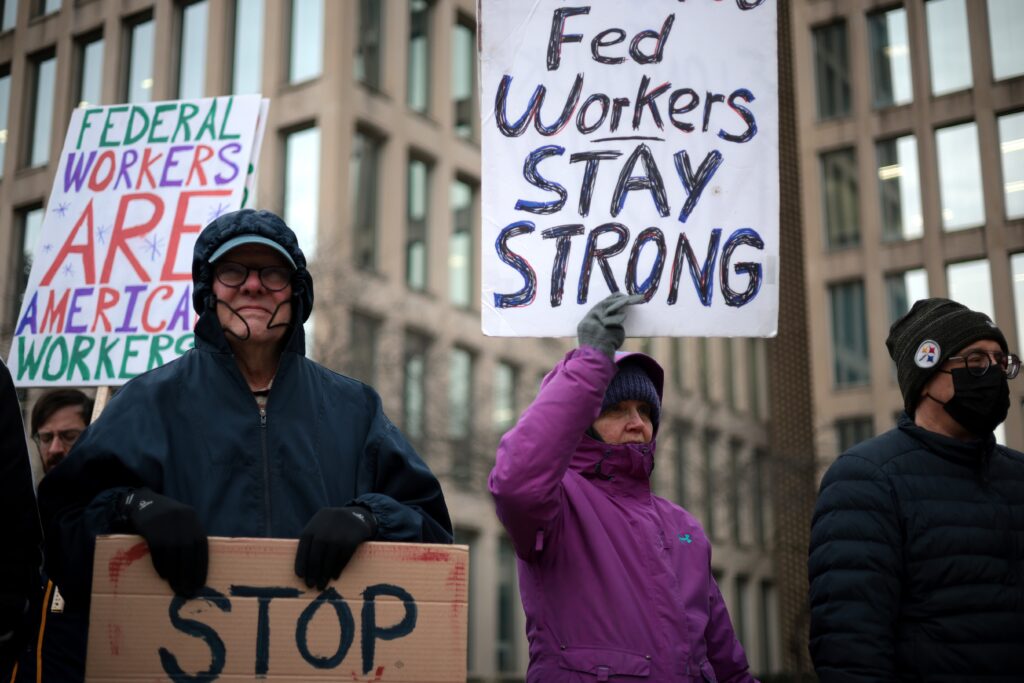Protesters rally outside of the Theodore Roosevelt Federal Building headquarters of the U.S. Office of Personnel Management on Feb. 5, 2025 in Washington, DC. (Photo by Alex Wong/Getty Images)
WASHINGTON — The Trump administration announced Friday it had begun mass layoffs of federal employees, a step not taken during previous government shutdowns and one that could significantly reshape the size and scope of the government.
White House budget director Russ Vought posted on social media mid-day that Reductions in Force, the technical name for layoffs, had started.
“The RIFs have begun,” Vought wrote.
Vought didn’t share any other details on social media and a budget office spokesperson only said that the layoffs would be “substantial” after States Newsroom asked for information about how many federal workers and which departments would be impacted. The government shutdown began on Oct. 1 after Congress failed to pass a short-term spending bill.
Labor unions that represent federal workers indicated they plan to let the judicial system determine whether the layoffs are legal.
American Federation of Government Employees National President Everett Kelley wrote in a statement that it “is disgraceful that the Trump administration has used the government shutdown as an excuse to illegally fire thousands of workers who provide critical services to communities across the country.”
“In AFGE’s 93 years of existence under several presidential administrations – including during Trump’s first term – no president has ever decided to fire thousands of furloughed workers during a government shutdown,” Kelley wrote. “AFGE is currently challenging President Trump’s illegal, unprecedented, abuse of power and we will not stop fighting until every reduction-in-force notice is rescinded.”
AFGE represents about 820,000 federal and D.C. government workers.
The American Federation of Labor and Congress of Industrial Organizations, more commonly known as the AFL-CIO, posted on social media that “America’s unions will see you in court.”
Several labor unions — including AFGE; AFL-CIO; and the American Federation of State, County and Municipal Employees — filed a lawsuit in late September in the Northern District of California challenging the legality of any layoffs during a shutdown and later asking the judge for a temporary restraining order.
Judge Susan Illston gave the Trump administration until the end of Friday to provide details of any planned or in-progress Reductions in Force, “including the earliest date that those RIF notices will go out.”
An updated brief from the labor unions says they have information from “credible sources” that about 1,300 Treasury Department workers will be laid off but didn’t have information about the dozens of other departments and agencies.
Layoffs, funding cuts, loss of back pay threatened
President Donald Trump has signaled for the last couple weeks that if Democrats didn’t help Republicans advance the stopgap funding bill in the Senate, he would take action.
“I’ll be able to tell you that in four or five days if this keeps going on,” Trump said Tuesday. “If this keeps going on it’ll be substantial and a lot of those jobs will never come back.”
Trump said Thursday that he would cut funding approved by Congress for programs he believes are supported by or generally benefit Democrats, but he didn’t provide any more details during a Cabinet meeting.
Trump has also floated the idea of not providing back pay for furloughed federal employees, though he hasn’t made any firm determinations about whether he may try to reinterpret a 2019 law that guarantees back pay for all federal workers after a shutdown ends.
The Congressional Budget Office estimated before the shutdown began that some 750,000 federal employees would be furloughed. Others have continued working but without pay.
Thune blames ‘far-left activist base’ for shutdown
Vought’s announcement came just as House Speaker Mike Johnson, R-La., and Senate Majority Leader John Thune, R-S.D., wrapped up a joint press conference on Capitol Hill, where they called on Democrats to vote to reopen the government.
“We have a majority of United States senators — 55 out of 100 senators are voting to open up the government,” Thune said. “We need five bold, courageous Democrats with a backbone who are willing to take on their far-left activist base and join us in passing this.”
Thune largely rejected the idea floated by some Republican lawmakers that the chamber should get rid of the 60-vote threshold for advancing major legislation, which has so far blocked the House-passed stopgap spending bill from moving toward final passage.
“There are folks out there that think that is the way we ought to do things around here, simple majority,” Thune said. “But I can tell you that the filibuster through the years has been something that has been a bulwark against a lot of bad things happening to the country.”
Thune added the legislative filibuster, which is different from the talking filibuster that most people are familiar with, is necessary to protect the rights of the minority political party and give it a voice in running the government.
Johnson nixes vote again on military pay
Johnson, R-La., remained consistent during an earlier press conference that he will not bring the House back into session to vote on a bill to ensure on-time pay for military members during the shutdown. He’s repeatedly said the best way to avoid delayed paychecks for federal workers is for Democrats to advance the House-passed stopgap spending bill.
The stalemate over government funding largely revolves around whether congressional leaders will be able to find bipartisan compromise and enact legislation to extend enhanced tax credits for people who buy their health insurance through the Affordable Care Act Marketplace, which are set to expire at the end of the year.
Democrats argue lawmakers need to broker an agreement now, before open enrollment begins on Nov. 1. Republican leaders contend they’re willing to talk after the government reopens, but they haven’t provided any commitments and have been tight-lipped about what they’d be willing to consider.
House Democratic Leader Hakeem Jeffries, D-N.Y., said during a morning press conference before the layoff announcement that Republicans must compromise on health care.
“What we’ve said to our Republican colleagues is we have to address the health care crisis that they’ve created decisively — that means legislatively and that means right now,” Jeffries said.
Energy projects canceled in 21 states
Trump’s action to block funding for projects in the states has drawn objections from Democrats.
Thirty-seven Democrats sent a letter to Energy Secretary Chris Wright Thursday rebuking the administration for “unlawfully cancelling $8 billion in federal investments in 223 energy projects.”
“For the 21 states with impacted projects, your cancellations will mean thousands of lost jobs for Americans, many of whom had every reason to rely on the stability of their jobs before these cancellations and all of whom will face uncertain job markets in our increasingly slowing economy,” they wrote.
The letter was signed by Democratic Sens. Angela Alsobrooks and Chris Van Hollen of Maryland, Michael Bennet and John Hickenlooper of Colorado, Richard Blumenthal and Chris Murphy of Connecticut, Lisa Blunt Rochester and Chris Coons of Delaware, Cory Booker and Andy Kim of New Jersey, Maria Cantwell and Patty Murray of Washington, Catherine Cortez Masto and Jacky Rosen of Nevada, Tammy Duckworth and Dick Durbin of Illinois, Ruben Gallego and Mark Kelly of Arizona, Kirsten Gillibrand and Chuck Schumer of New York, Maggie Hassan and Jeanne Shaheen of New Hampshire, Martin Heinrich and Ben Ray Luján of New Mexico, Mazie Hirono and Brian Schatz of Hawaii, Amy Klobuchar and Tina Smith of Minnesota, Edward Markey and Elizabeth Warren of Massachusetts, Jeff Merkley and Ron Wyden of Oregon, Alex Padilla and Adam Schiff of California, Bernie Sanders and Peter Welch of Vermont and Sheldon Whitehouse of Rhode Island.





